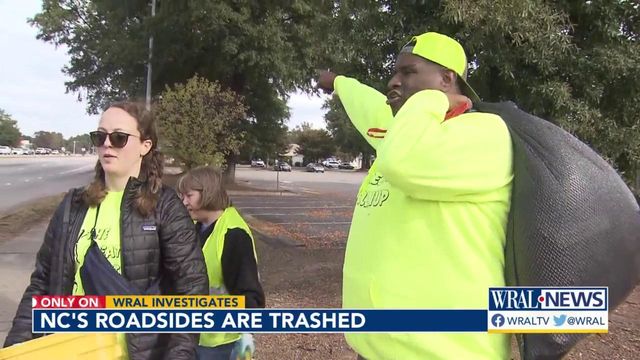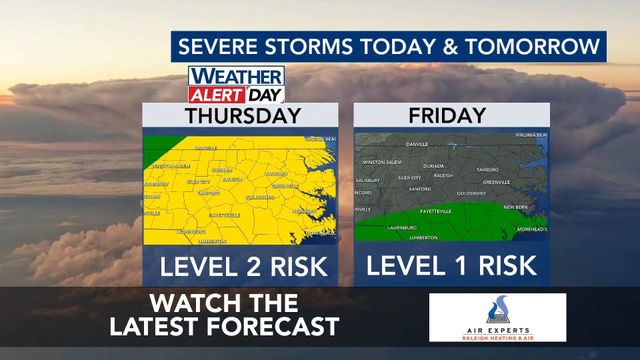WRAL Investigates: Record year for roadside trash in NC is more than just an eyesore, it could be making your commute more bumpy
Bottles, food wrappers and cigarette butts: They’re all things that should end up in the trash.
Unfortunately, too much of it ends up on roadsides.
Despite campaigns against littering and programs to get volunteers to help clean up our roads, North Carolina’s trash problems keeps getting worse.
In 2018, state crews, contractors and volunteers picked up 6.8 million pounds of roadside garbage. The figure grew to more than 10 million pounds the next year. After a pandemic pause in cleanup in 2020, trash pickup hit a record 13 million pounds in 2021. WRAL Investigates found the trash is more than just an eyesore.
"In a way, it’s offensive," said Zach Owens, a volunteer who does his part to clean up other people’s trash.
"It’s like the ’70s are happening all over again," another volunteer, Susannah Naglee said.
Jess Nolting says she’s fed up, "How can you live on this Earth and just want to disrespect an area you want to call home?"
The brightly-clad volunteers are working to change that mentality. Led by Preston Ross, they’re doing their part.
"We try to do a cleanup every weekend," said Ross, who started the Great Raleigh Cleanup.
The mission evolved into a non-profit attracting close to 700 volunteers who’ve picked up more than 85,000 pounds of litter in two years.
"Whatever little impact we can do out here to help clean up and it feels good," Owens said of his volunteer experience. "You know, I feel motivated to come out."
North Carolina Department of Transportation Environmental Engineer David Harris oversees the state’s roadsides from wildflowers to waste.
"I think there is a mindset. And during 2020, when we couldn’t pick it up, we saw more people just throwing garbage out," Harris said of the current trends.
Another big part of the problem, trucks carrying all kinds of debris, some spewing out trash from unsecured loads.
"I just wish people would spend as much time as they do on other social issues and just don’t throw the trash out, or just make sure their loads are secure," Harris said.
Harris expects the state to spend close to $22 million this year picking up what shouldn’t be thrown out. All money that would otherwise be spent on repairing roads and bridges.
Aside from volunteer efforts, the state also has a relatively new sponsor-a-highway program where businesses pay for contractors to remove trash in exchange for roadside advertisements.
Johnson Automotive took advantage of the first come offering by spending millions a year to buy close to a thousand miles of cleanup territory. Take a trip down Interstate 40 from the Triangle and the blue signs are everywhere.
Aside from public service campaigns, the state spends most time and money on pickup, not prevention. While more than 4,000 people reported offenders to the state’s Swat-A-Litterbug program so far this year, suspected violators only get warning letters in the mail.
"I think enforcement is always one issue that we’ve always struggled with," Harris said.
At a time when many are divided, disgust for roadside trash remains one of the few opinions that unite.
"People just want to live in a clean city while we figure out the rest, let’s get the trash up," Ross said of his group’s mentality.
The most obvious solution and hardest to achieve is altering the sloppy behavior that leaves this mess.
"It takes such little effort to put it where it belongs," Owens said.
Wake County used a consumer app to collect data on the most common roadside trash. Anyone thinking that flicking cigarette butts is no big deal is wrong. It was the most common trash found, followed by bottles and food wrappers.
Anyone interested in joining the cleanup effort, can go to www.raleighcleanup.org. The North Carolina Department of Transportation also provided other groups who are part of the Adopt-A-Highway program who are looking for help. In Franklin County, contact Sandra Chappell at (919) 605-6979. In Wake Forest, contact town employee Jeannette Johnson at jjohnson@wakeforestnc.gov. Finally, in Durham, the Creekside Adopt-A-Highway contact is Kevin Walls, who can be reached at wallskev@gmail.com.











